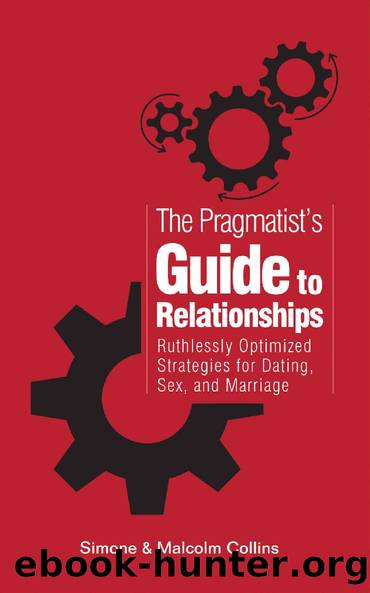The Pragmatist's Guide to Relationships: Ruthlessly Optimized Strategies for Dating, Sex, and Marriage by Malcolm Collins & Simone Collins

Author:Malcolm Collins & Simone Collins [Collins, Malcolm & Collins, Simone]
Language: eng
Format: epub
ISBN: 9780999715451
Publisher: Pragmatist Foundation Inc., The
Published: 2020-07-16T00:00:00+00:00
To create rewards and punishments when training someone, simply express pride or disappointment. That is itâthough it helps to use more colorful and varying verbiage. If a person loves or respects someone, simple words from that person can raise their spirits to the moon or dash their emotional states to the dirt (and a relationship devoid of respect has already failed; terminate it and try again).
Positive emotional stimuli are not relegated to compliments and the like. Any attention given to a target can be a source of positive emotional stimuli. When a partner shares something they are proud of, taking the time to explore it and engage with them will train them to put effort into that work in the future, whereas ignoring them trains them to invest less time in the activity. This is often more of an issue with accidental negative training, such as consoling someone (thereby giving them attention) when they cry, which makes emotional composure more difficult for those who crave attention in the future.
Those who resort to anger or gifts for punishments and rewards will have to continually increase the magnitude of their anger and gifts to elicit the same response. The shouting tantrums will have to escalate in order to land the same impact. The gifts will have to get more expensive in order to yield the same delight. We have all seen relationships destroyed by individuals who attempt to use anger or gifts to guide their partnersâ behavior.
Getting sad and angry for a day or even an hour in response to something a partner did is not training and not effective because a good partner will not reward such demonstrated lack of emotional control with a pleasant response, lest they encourage more of it. In other words, regular loss of emotional composure merely trains a partner to ignore these outbursts. An intentionally implemented negative stimuli should never take more than one minute to expressâany negative emotional display that lasts longer is simply a failure at emotional control.
A simple and calmly delivered verbal affirmation or condemnation is the only reliable method of punishment or reward in the long term. This is also a better method because demonstrating emotional control increases respect, and increased respect makes words carry more weight over time.
Attempts to train partners to change in a way that only yields one-sided benefit lowers the effectiveness of all other training (at least if such attempts to do so leverage negative stimuli). Criticizing a partner for something that is self-servingâsomething that patently does not align with their goals for themselvesâsignals to the partner that they should ignore you. This takes the bite out of any expression of disappointment in them in the future, which in turn renders all training more difficult. When trying to train people in a self-serving direction, stick only to positive stimuli and reward pathways.
Partners must be extremely explicit about (1) the behavior they are trying to change, and (2) what the partner being trained could and should have done instead.
Download
This site does not store any files on its server. We only index and link to content provided by other sites. Please contact the content providers to delete copyright contents if any and email us, we'll remove relevant links or contents immediately.
The Concise Laws of Human Nature by Robert Greene(1241)
Bioenergetica by Alexander Lowen(1130)
After by Bruce Greyson(941)
The Child in You by Stefanie Stahl(892)
Stress-Proof Your Brain The Yogic Way: Unique Ancient Indian Techniques to End Toxic Stress, Stop Worrying and Inculcate Mental Toughness by Advait(876)
Badass Habits: Cultivate the Awareness, Boundaries, and Daily Upgrades You Need to Make Them Stick by Jen Sincero(795)
Talk of the Ton by unknow(739)
Chakras & Self-Care by Ambi Kavanagh(709)
The Power of Myth by Joseph Campbell & Bill Moyers(680)
Self-Care for Empaths by Tanya Carroll Richardson(639)
No Bad Parts by Richard C. Schwartz(628)
Learn To Think Using Thought Experiments by King Patrick(625)
The Mind by E. Bruce Goldstein(618)
Curative Magic by Rachel Patterson(590)
The Quantum Psychiatrist: From Zero to Zen Using Evidence-Based Solutions Beyond Medication and Therapy by Biswas Dona(557)
The 7 Secrets of Sound Healing Revised Edition by Jonathan Goldman(553)
The Tao of Intimacy and Ecstasy by Solala Towler(543)
Living a Life of Awareness by Don Miguel Ruiz Jr(534)
The Anxiety First Aid Kit by Rick Hanson(530)
